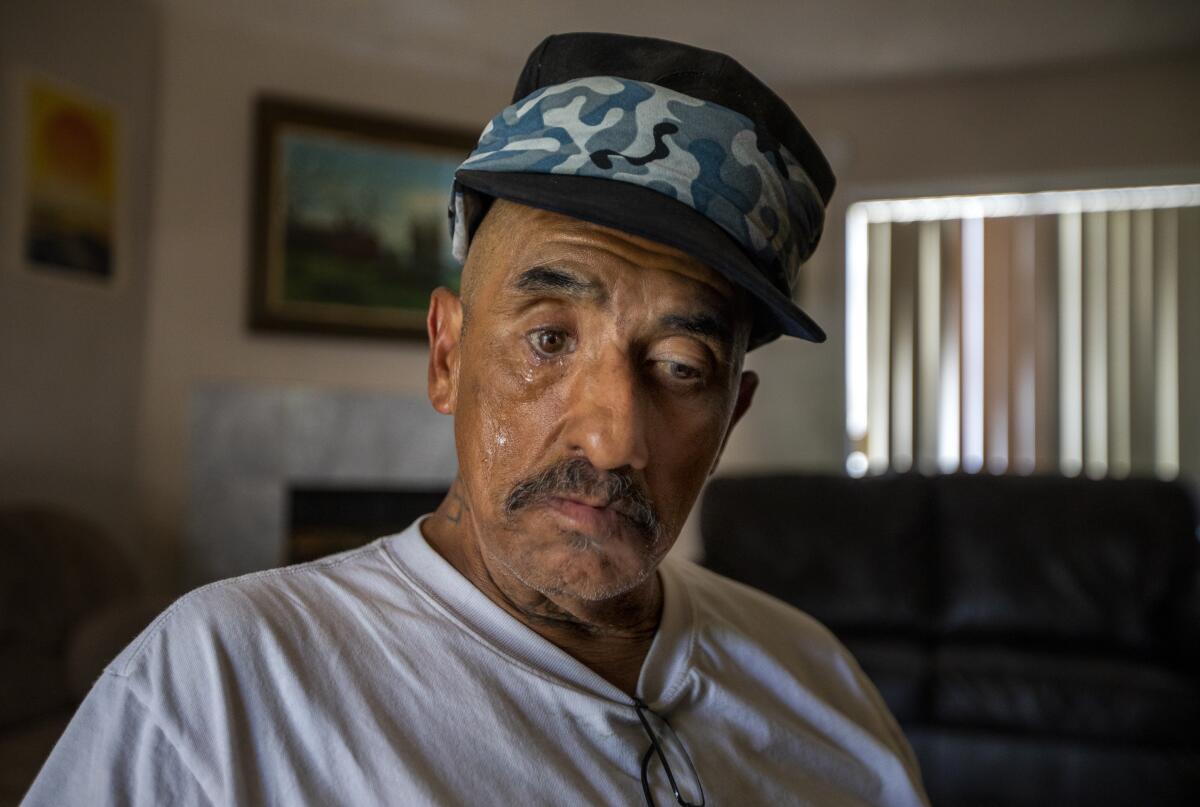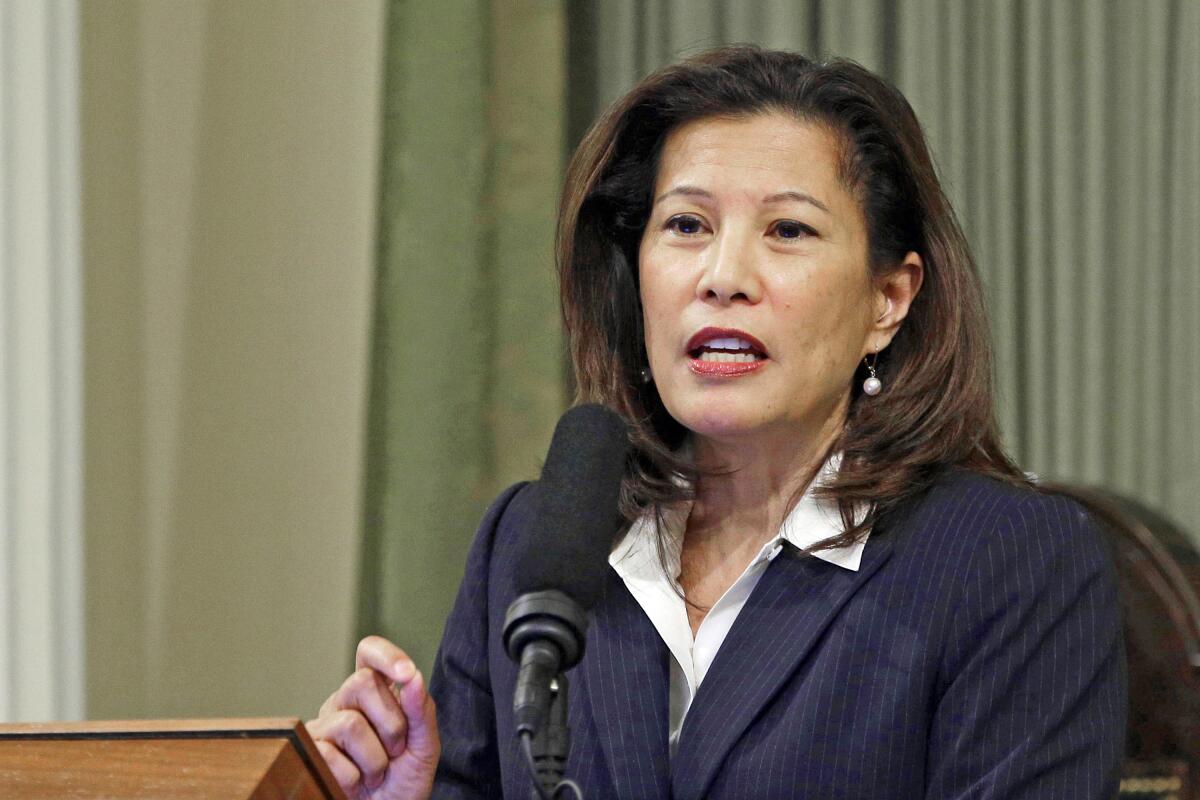Mental health is in the spotlight. The Times is digging deep ‘For Your Mind’

Good morning, and welcome to the Essential California newsletter. It’s Thursday, July 28. I’m Lila Seidman, writing from the (surprisingly temperate!) San Fernando Valley. My colleague Gale Holland contributed from over the hill, in Echo Park.
As a reporter studying to become a therapist, I jumped at the chance to join The Times’ new mental health initiative.
For Your Mind launched earlier this month and is dedicated to reporting on treatment, public policy and wellness. (And it’s easily identifiable by its colorful, engaging logo!)
Mental health news and resources to help you cope with the stress of daily life, anxiety and more.
Not only is it an area of personal interest and growing expertise, but it’s also timely. Mental health, for many, is top of mind.
The pandemic, social unrest, political strife and even climate threats have leveled unprecedented psychological stressors at me, you, our neighbors, our kids — everyone. For many, anxiety, depression and malaise were already bubbling perilously close to the surface before the dam, proverbially, broke.
(Young people are especially hurting. The U.S. surgeon general issued a rare public advisory last winter calling for action to address the nation’s youth mental health crisis, and my colleague Madalyn Amato reports that Gen Zers are desperate for mental health resources at their college campuses.)
[Read the story: “Gen Z students want better mental health care access on campus” in the Los Angeles Times.]
There’s also heightened attention to how severe mental illness might contribute to the homelessness crisis. Although there are many factors that can lead to homelessness — including rising rents and addiction — a recent California Policy Lab study suggests that roughly 17% of Los Angeles’ unhoused population suffers from a psychotic spectrum disorder or other serious mental disturbance.
Yet homes that serve low-income adults struggling with debilitating mental illness — who are often at risk of homelessness — are rapidly closing, as I reported this month. As property values soar, owners of what are informally known as board and cares are selling their buildings to developers for big payouts while state leaders stand by.
On Wednesday, Los Angeles City Councilmember Nithya Raman introduced a resolution to require the city to support or sponsor legislation or administrative action that would significantly increase board and care operators’ reimbursement rate, which combines federal and state money. Currently, they’re given just $40 a day per resident whose care is paid for through public benefits, and even though the state plans to raise its portion of the rate, Raman believes it will be too little, too late.
“There’s a real urgency around figuring out, as board and cares are closing now, can we push for faster action,” Raman told me.
She added, “This is just one step of many that the city and county will have to act on together to make sure we’re not losing more beds in the coming years.”
[Read the story: “Homes for people with severe mental illness are rapidly closing. Will help come fast enough?” in the Los Angeles Times.]
Since 2016, at least 96 facilities have closed in L.A. County. That represents a loss of 1,687 beds at a time when affordable housing is alarmingly scarce. The city alone lost 369 beds between January 2020 and February 2021, Raman said.
Mark Samuel is planning to close down his large Van Nuys facility in three years if there’s no significant reform. It would send about 100 residents packing. Some came from the streets or psychiatric hospitals, and are at risk of returning.
“These are the forgotten people. They don’t have anybody,” Samuel said. “It breaks my heart knowing that if I end up closing, their community is going to be lost.”
Sign up for Essential California
The most important California stories and recommendations in your inbox every morning.
You may occasionally receive promotional content from the Los Angeles Times.
Keep your eyes peeled for more For Your Mind stories. As part of the initiative, we’re also launching a new newsletter, where our colleague Laura Newberry takes your questions and seeks out experts to get answers. Check it out here.
And now, here’s what’s happening across California:
Note: Some of the sites we link to may limit the number of stories you can access without subscribing.
L.A. STORIES
The race to sell L.A.’s most expensive condo ever: The $50-million 8899 Beverly penthouse in West Hollywood was unveiled at a party for top real estate agents replete with Champagne, caviar blinis and gardenias flown in from a Bay Area flower farm. The goal: to get a record-setting, blockbuster deal done before looming economic concerns damp rich-buyer behavior. Los Angeles Times

Behind Joni Mitchell’s triumphant return: It started with Joni’s Jams, the hootenannies that the 78-year-old superstar has held at her home in Bel-Air since she was grounded by an aneurysm. It was incubated on a boat over tequila. The story behind Mitchell’s surprise return to the Newport Folk Festival, where she last sang in the late 1960s, features a star-studded cast of musicians and admirers, ugly crying by Wynonna Judd, the soaring soprano of Brandi Carlile over Mitchell’s harmonies on “A Case of You,” and Mitchell’s spirited guitar solo on “Just Like This Train.” Los Angeles Times
Support our journalism
IMMIGRATION AND THE BORDER
Immigrant ID: The Biden administration is developing a new identification card for migrants that can serve as a one-stop shop to access immigration files and, eventually, be used for travel. CNN
POLITICS AND GOVERNMENT
Hulu ad ban blocks Democrats’ key midterm message: Hulu’s 45 million subscribers will not be seeing the Democratic Party’s ads on abortion rights and gun violence. The streaming service vetoed Democrats’ spots blaming the U.S. Supreme Court’s gutting of Roe vs. Wade on a “coordinated Republican attack on abortion,” and linking gun deaths to Republicans who “are more devoted to the gun lobby than taking common sense action to make our kids safe.” A source said Hulu’s long-standing guidelines prohibit advertising that takes a position on a controversial issue of public importance; Democratic leadership cried censorship. Los Angeles Times
CRIME AND COURTS
California’s chief justice will not seek reelection: Tani G. Cantil-Sakauye, chief justice of the California Supreme Court, said Wednesday she would not seek reelection next year, opening a third appointment to the state high court for Gov. Gavin Newsom. Cantil-Sakauye, a centrist appointed by Gov. Arnold Schwarzenegger, captured national attention in 2017 when she asked the Trump administration to remove federal immigration agents from state courthouses, where she said they were “stalking” people and eroding public trust. Los Angeles Times

Woman who said she was Charles Manson’s half-sister bows out of estate fight: Nancy Claasen withdrew from the Manson probate case in Los Angeles County Superior Court after the judge ruled that Jason Freeman, who claims to be the cult leader’s grandson, was indeed the son of Charles Manson Jr. A hearing is set for Aug. 12 to decide the paternal relationship between Manson and Manson Jr. Manson died in 2017 at Corcoran State Prison, where he was incarcerated for a string of grisly murders in 1969 across Los Angeles. Michael Channels, a longtime pen pal of Manson’s, says he is the heir and has a will to prove it. The “winner” in the probate fight will get a motley collection of guitars, clothes and personal writings that Manson had in prison. A lawyer for Freeman’s attorney says the items might be worth a lot of money. Los Angeles Times
EDUCATION
Sexual harassment findings on two Cal State professors were kept under wraps: After a few alcoholic drinks at a pizza joint near campus, a professor in the psychology department at Cal State San Marcos allegedly insinuated to a female student that he was turned on and started kissing her neck. In the chemistry department, another professor allegedly pressed his groin against a student. The university agreed to settlements with the professors, Roger Morrissette and David Bwambok, which included voluntary resignations, paid administrative leave and, in one case, expunging disciplinary records, according to documents obtained by The Times. Both men — who have denied the harassment and misconduct claims — are still teaching at other institutions, The Times found. Los Angeles Times
LABOR
United Farm Workers rejoins the fold: After years on its own, with declining fortunes, the United Farm Workers is coming back to the California Labor Federation, the “union of unions” that acts as an umbrella for the California labor movement, leveraging clout and money in elections and at the Capitol. And McDonald’s, Amazon, Big Ag and Gov. Gavin Newsom better watch out, columnist Anita Chabria writes. Los Angeles Times
HEALTH AND THE ENVIRONMENT
Oil company to pay Orange County nearly $1 million: Amplify Energy Corp.’s ruptured pipeline released 25,000 gallons of oil off Huntington Beach last October, killing 82 birds and six mammals and closing beaches for a week. The payment will cover Orange County’s spill costs, county officials said. Orange County Register
“Mysterious plastic items” were scooped up in a sweep of the Great Pacific Garbage Patch. Across 4,600 nautical miles, the ship’s crew recovered garbage in the vast Pacific area between Hawaii and San Francisco. The ship’s captain, Locky MacLean, said one mystery object looked like a massive pontoon covered in gooseneck barnacles. But no one could tell what it really was. San Francisco Chronicle
CALIFORNIA CULTURE
Anger boiling over on L.A. streets: The first six months of 2022 saw 459 reports of road rage in Los Angeles, according to Los Angeles Police Department data. That’s a 32.7% increase over the same period last year, and almost 140 more incidents than were tallied in the first half of 2019. The record 90 road rage reports in June beat the previous high one month before. Crosstown
East of East: The Making of Greater El Monte, a curated collection of 31 essays, tells the story of America’s multiethnic suburbia and reimagines public history through the vivid lives of anarchists, farmworkers, punks, writers and more in the San Gabriel Valley. Tropics of Meta
Free online games
Get our free daily crossword puzzle, sudoku, word search and arcade games in our game center at latimes.com/games.
California almanac
Los Angeles: Cloudy, giving way to sunny, 82. San Diego: Cloudy, then mostly sunny, 74. San Francisco: Cloudy, then partly sunny, 66. San Jose: Mostly sunny, 82. Fresno: Sunny, 102. Sacramento: Sunny, 97.
And finally
Today’s California memory comes from Sean Gallagher:
As a kid in Cambria there were only three events you looked forward to all year: the weekly high school Broncos football games (always a slaughter), the Pinedorado yearly festival (still going strong) and “Locals Day” at Hearst Castle. The town depended on the castle and the castle depended on the town. Everybody had a relative who worked there. My Uncle Donny gave up commercial abalone diving to be an electrician up there. So one day a year buses would take the locals to the castle for an extravagant lunch, a tour and a swim in the luxurious outdoor pool, my favorite place in my known universe. It made swimming in the Santa Rosa creek look like foolish child’s play. The three-hour tour lasted, it seemed like, only minutes, but during that brief moment I was the richest boy in the world.
If you have a memory or story about the Golden State, share it with us. (Please keep your story to 100 words.)
Please let us know what we can do to make this newsletter more useful to you. Send comments to [email protected].
Sign up for Essential California
The most important California stories and recommendations in your inbox every morning.
You may occasionally receive promotional content from the Los Angeles Times.






